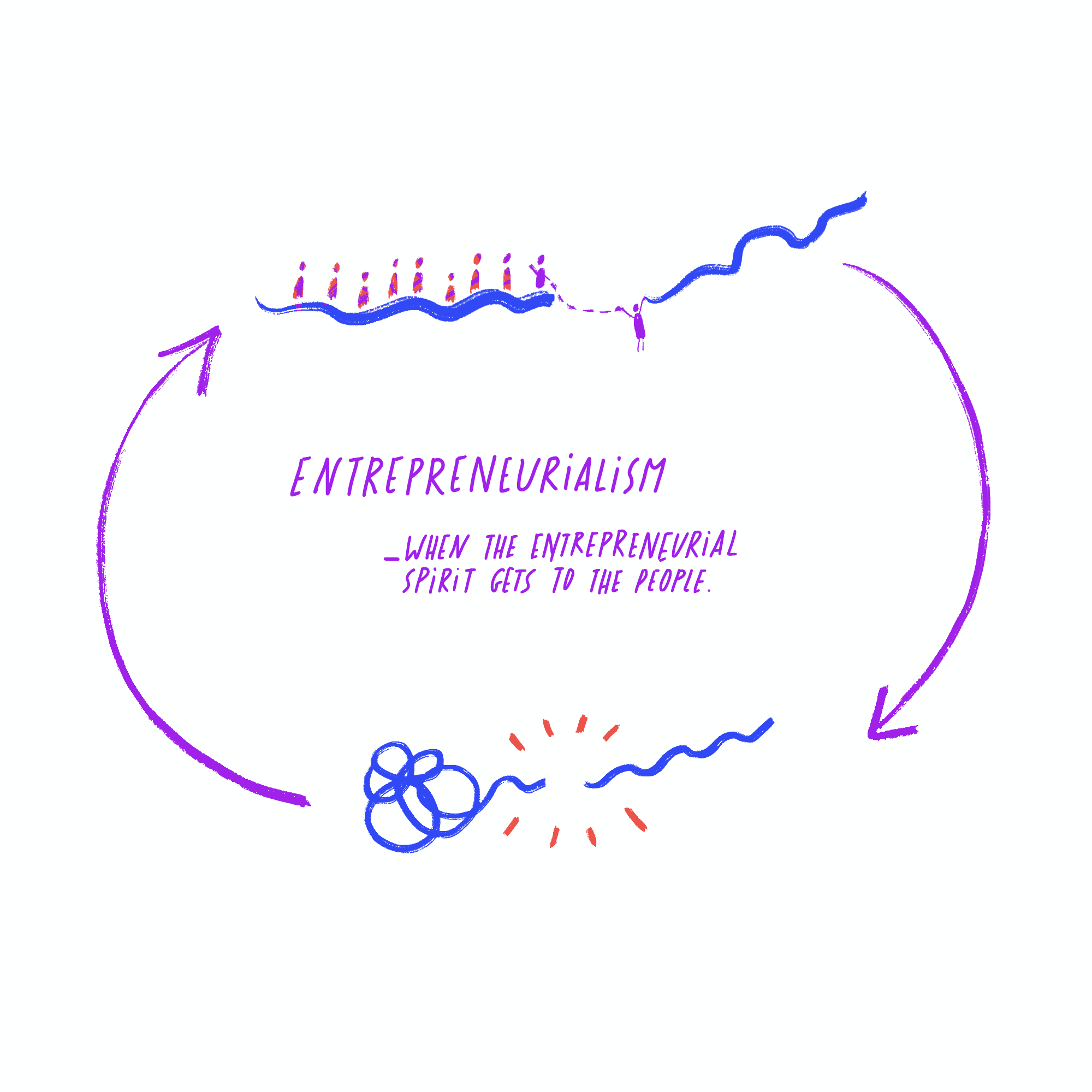A Tiny Illustrated Glossary of Precarity
Print your own tiny zine on A4 paper and fold it on your own.
What is a precariat? Who lives there? What are its inhabitants like? Let's find out!
Precariat is a term brought to public by Guy Standing in 2011. It is used to describe a social group consisting of people whose lives are difficult because they have little or no job security and few employment rights. However, during the last 10 years it became much more than that: seen as an emerging class in society, some authors define it as a generation, a class in the making or even a reality we are living in.
This tiny glossary collects some terms connected to the precarity. It gives an entry point to any beginner who has not yet been introduced to the topic in detail. A collection of explanations of some terms mainly seen in the reads Entreprecariat: Everyone Is an Entrepreneur. Nobody Is Safe. (Onomatopee) by Silvio Lorusso (2020) and General Theory of the Precariat by Alex Foti (2017). The glossary is also in the making, as the precarious state of living itself. Work is still in progress.
Part of Summer Experiments project.
![Al Nik [precarity: making the ends meet]](precarity_2.jpg)
- precariat
- precarity
- entreprecariat
- entrepreneurialism
- San Precario

[term brought to publics by Guy Standing] an emerging class of workers who are harmed by low wages and poor job security as a consequence of globalisation. Standing describes the precariat as an agglomerate of several different social groups, notably immigrants, young educated people, and those who have fallen out of the old-style industrial working class.
In sociology, precariat refers to the social class formed by people with no job security, or no prospect of regular employment, distinct from the lumpenproletariat. The term is a neologism obtained by merging precarious with proletariat. The precariat class has been emerging in advanced societies such as Japan, where it includes over 20 million so-called "freeters". The young precariat class in Europe is becoming a serious issue since the early part of the 21st century.

[also precariousness] is a precarious existence, lacking in predictability, job security, material or psychological welfare. The social class defined by this condition has been termed the precariat. [to be added - precarity as...]
"What do we talk about when we talk about precarity? Providing a single answer is impossible and probably counterproductive as it would involve an inevitable oversimplification. What is more, the literature is vast and derives from widely varying contexts. The issue of precarity touches Italy and France, as well as the United States, Venezuela and Japan. People fight under the banner of the precariat in Finland, Spain and the United Kingdom. Journalists and academics speak of precariousness, just as do politicians, workers and students." - Silvio Lorusso

[crafted by Silvio Lorusso] a portmanteau that combines entrepreneurialism and the precariat. As such, it captures both as coexisting axes of a semiotic square of the social. On a basic level, the entreprecariat refers to the reciprocal influence of an entrepreneurialist regime and pervasive precarity.

The spirit or state of acting in an entrepreneurial manner. "When the entrepreneurial spirit gets to the people, entrepreneurship becomes entrepreneurialism." - Silvio Larusso

February 29 is the feast day of San Precario, the patron saint of precarious workers, who – together with his feast day – was created by the Chainworkers at the Milanese space Reload where the 2004 EuroMayDay was organised with others, including the Critical Mass group. The Milan Critical Mass already had its own patron saint, "Santa Graziella" (Graziella is the brand name of a popular Italian folding bicycle).
- flexploitation
- infocapitalism
- positional consumption
- status discord
- profician
- cognitariat
- salariat
- quitting economy
- intrapreneur
- make the ends meet
a schizophrenic form of exploitation that makes individuals “quantum workers”, subject to an unpredictable combination of various levels of employment. It is a working condition that affects the existential dimension, populated by stress, anxiety and social exclusion. To heighten frustration, there is the awareness of being collectively indispensable but individually disposable. [SL p.52]
information capitalism refers to the increasing importance of information within capitalism under conditions of globalization and rapid technological development. The idea of “information capitalism” is closely related to similar concepts such as knowledge economy (Drucker [1969] 1992), postindustrial society (Touraine 1971; Bell [1973] 1976), information society (Webster 2002), and network society (Castells 2000). [mentioned SL p.52]
consumption in that it produces costs (e.g. a master’s degree in creative writing or an unpaid internship) [SL p.49]
a contrast between an imagined status (perhaps in relation to their own family standards and educational level) and the real one, with a low income, instability and lack of professional recognition. [SL p.46]
recognised professionals who jump from one project to another without difficulty — and the unemployed [SL p.46]
term created by Berardi: if the proletariats’ only property was their offspring, for the cognitarian it becomes the totality of their own cognitive faculties, expressed through language and creativity. Cognitarians are alienated from their main product, language, and from their peers, due to deterritorialisation and discontinuities that prevent them from implementing permanent forms of social organisation. What cognitarians experience is more than a temporary phase, as precarity — Bifo tells us — is the name of the era that follows modernity. [SL p.41]
the class or body of salaried persons usually as distinguished from wage earners; salary-earning class
an economy based, if one is lucky, on the possibility of moving freely or semi-freely between one job and another [S.L. p.64]
an employee who is tasked with developing an innovative idea or project within a company. The intrapreneur may not face the outsized risks or reap the outsized rewards of an entrepreneur. However, the intrapreneur has access to the resources and capabilities of an established company; The term "intrapreneur" is a portmanteau of the two words "internal" and "entrepreneur." It was first coined by Gifford Pinchot III and Elizabeth S. Pinchot in a 1978 white paper. [source: investopedia]
[idiom] to pay for the things that you need to live when you have little money
[sources] Entreprecariat: Everyone Is an Entrepreneur. Nobody Is Safe. (Onomatopee) by Silvio Lorusso (2020) // General Theory of the Precariat by Alex Foti (2017) // The Precariat: The New Dangerous Class by Guy Standing (2011)